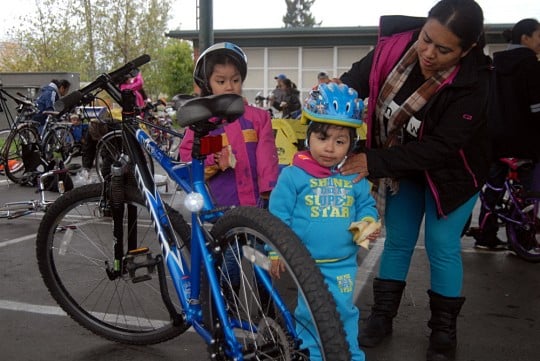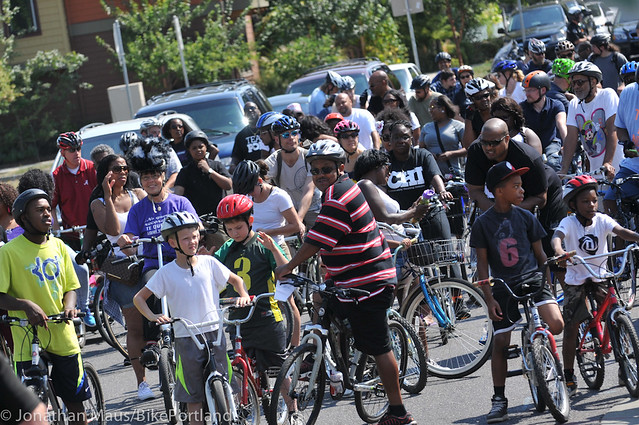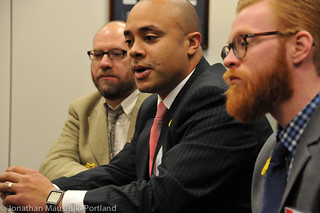
(Photos: J.Maus/BikePortland)
In 2008, Portland’s nonprofit bike shop kicked off an initiative to be known for more than reliable used bikes and Christmastime giveaways. And it succeeded.
The Community Cycling Center‘s 2010 report Understanding Barriers to Bicycling, based on interviews with dozens of residents of the New Columbia and Hacienda low- and mixed-income housing developments, is regularly cited around the country as a key piece of research about the ways bicycling decisions vary by race and ethnicity.
Last fall, the League of American Bicyclists opened their report “The New Movement: Bike Equity Today” with a summary of the CCC’s findings and the programs they spawned: a free community bike shop hub and bike skills course in New Columbia, and a family bike-fun group at Hacienda.
After a few years, bicycle culture is clearly on the rise in both spots. Last summer, responding to a series of violent incidents in Portland, a few men involved with the New Columbia area approached the CCC for advice. Its organizers helped them create a widely attended Take Back the Streets ride through North Portland. Last November, we covered the Dia de los Muertos ride promoted by Andando en Bicicletas en Cully, the Hacienda-based family biking group, and Mujeres en Movimiento, another new Latina-led bike group in Portland.

(Photo: M.Andersen/BikePortland)
ABC has also succeeded in getting funding for secure bike parking to eventually be retrofitted into their development — something residents there had named in the 2009 interviews as one of their main reasons for not using bikes.
Advertisement
But those and other CCC programs have been largely powered by government grants, and for one reason or another since 2011, those grants have dried up, at least for now.
CCC CEO Mychal Tetteh, a former manager of the CCC bike shop, returned to lead the CCC in the midst of that trend, in 2013. He said in an interview Sunday that the CCC grosses about $1 million a year from its Alberta Street bike shop, $250,000 to $300,000 from individual and corporate donations and (as of 2011) $380,000 or so from government and foundation grants and contracts.
But in the last four years, that $380,000 has fallen to $80,000. The Portland Children’s Levy, the federal Jobs Access Reverse Commute program and (as of last week) Metro’s Regional Travel Options program have all cut their support for CCC programs.
Last week’s loss of the Metro grant creates a $75,000 gap in the CCC’s budget starting July 1. That includes most of its staff support for both programs.
Tetteh said the New Columbia and Hacienda programs have become “core” for the CCC and will continue no matter what.
“These are fundamental to the success of the Cycling Center going forward,” he said. “We’re committed to continuing the work that we do that’s nationally recognized. … This includes our commitment to our partners at New Columbia and Cully.”
Tetteh said he thinks the best long-term source of new funding for the CCC is government programs that aren’t specific to bicycling.
But he said that although the CCC is in some ways an “outlier” within the bicycle movement, sone of the biggest obstacles to CCC funding are the same “stigmas” that hold back other parts of the bike movement.
“If you’re sitting around the table and you’re making a deicison about a funding stream and in the back of your mind you think a bicycle is a toy and not a tool, then we still have a lot of work to do,” Tetteh said. “You’ve got to have a lot of inside game in a lot of different places to make that happen.”
Tetteh said that as Portland continues to grow and its population becomes more and more dominated by non-natives, it’s becoming more important for active transportation advocates to present their arguments in broadly appealing ways.
“We’re not necessarily having messages that are really appealing to people who sit in traffic all day.”
— Mychal Tetteh, CEO of the Community Cycling Center
“Traffic isn’t going to get any better,” Tetteh said. “Active transportation folks like us, we get it. [But] we’re not necessarily having messages that are really appealing to people who sit in traffic all day.”
Tetteh said Portland deserves to be more than a mediocre transportation town, and is in the “goldilocks zone of the goldilocks zone” as a place where bicycling has huge potential to keep growing.
So the CCC will find some way to continue its programs helping marginalized Portlanders use bikes in their daily lives.
“The urgency that we carry in the delivery of our mission means that we can’t sit around, we can’t hang our heads, if we don’t get funding,” Tetteh said. “The work has to continue.”
Want to help the CCC a bit while having a good time? Come to its Transportation Trivia event Tuesday evening at the Oregon Rail Heritage Center, 2250 SE Water Ave at 6 pm. $10 at the door buys you a beer and a chance at trivia glory; bring a card or checkbook for optional donations to help the CCC.




